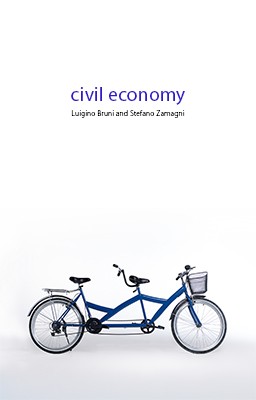Another Idea of the Market
 Luigino Bruni and Stefano Zamagni
Luigino Bruni and Stefano Zamagni
Publisher: Agenda Pub, January 201
Product code: 9781911116004
buy on Agenda Pub
Global financial capitalism has eroded the moral economy on which all economic exchanges ultimately depend. The principles of reciprocity, responsibility and redistribution, which for centuries defined the market place, have been increasingly pushed aside by a growth model that places the pursuit of profit above all else.
Drawing on the Italian tradition of civic humanism, political economists Luigino Bruni and Stefano Zamagni, advocate the need for a more well-mannered type of economic market – a civil economy – which places well-being, virtue, and the common good alongside more familiar economic goals like market share, increased productivity, and competitiveness.
This book provides an introduction to the civil economy approach. It explores its origins and development, examines the thought and ideas of some of its pioneers and main representatives, and explains the many different fields of application of the civil economy, from the determination of gross domestic product to the management of common goods, from welfare to the organization of production and consumption. Civil economy seeks to find solutions to social problems within the market – while maximizing human values and minimizing government intervention – rather than seek to replace the market. It is a distinct and valuable approach and one that offers individuals, corporations and governments a framework for a humane and socially accountable, yet productive and competitive system of markets.
ABOUT THE AUTHOR
Luigino Bruni is professor of political economy at LUMSA Universita, Rome. He is the author, most recently, of The Genesis and Ethos of the Market (2012) and Reciprocity, Altruism and Civil Society (2008) and co-editor, with Stefano Zamagni, of the Handbook on the Economics of Reciprocity and Social Enterprise (2013) and, with P. Porta, the Handbook of Happiness and Economics (2005).
Stefano Zamagni is professor of economics at the University of Bologna, and senior adjunct professor of international economics and vice director of Italian affairs at the School of Advanced International Studies, John Hopkins University, Bologna. His books include An Outline of the History of Economic Thought, with Ernesto Screpanti, (2005) and Markets, Money and Capital, coedited with Roberto Scazzieri and Amartya Sen (2009).








